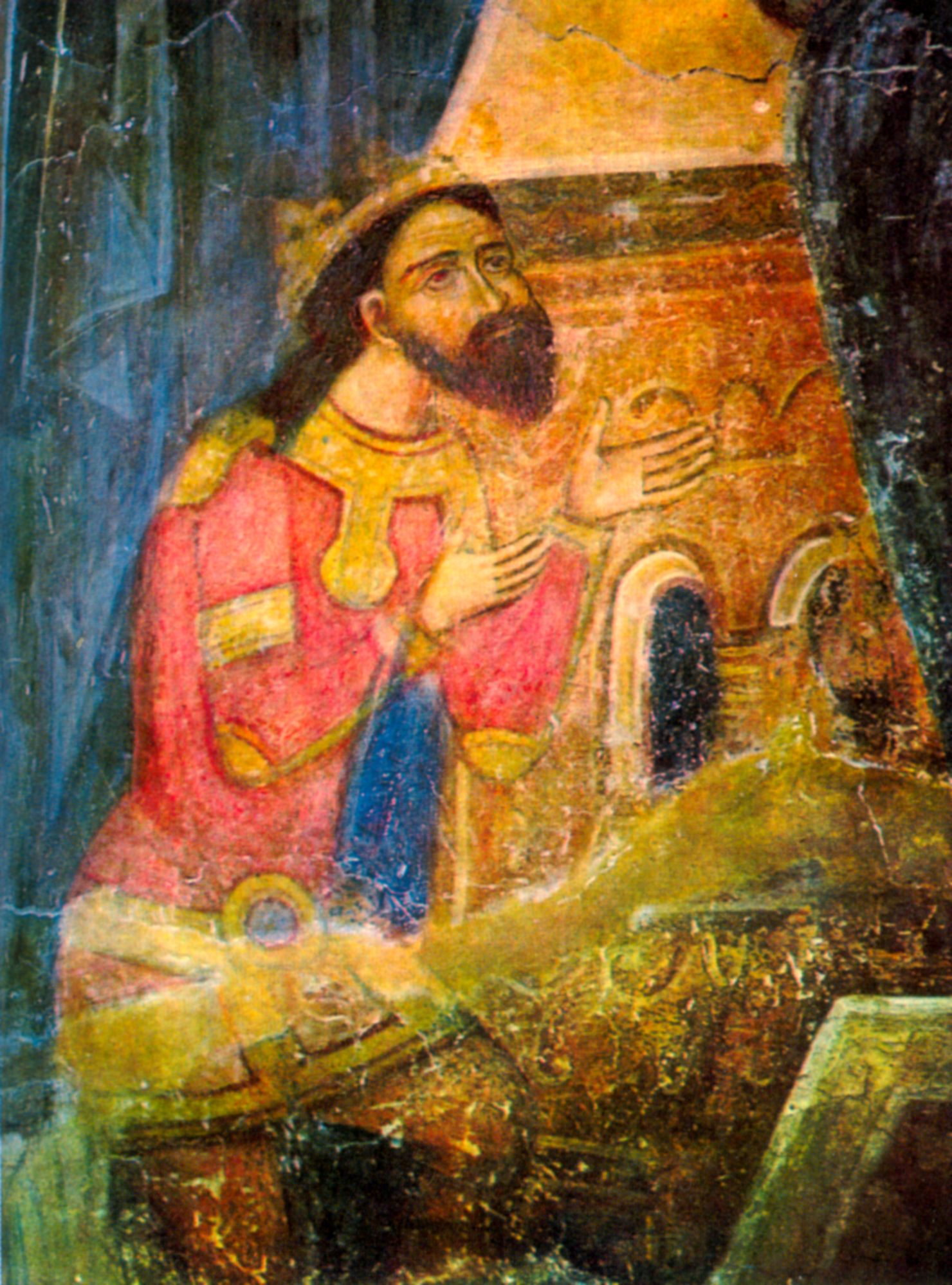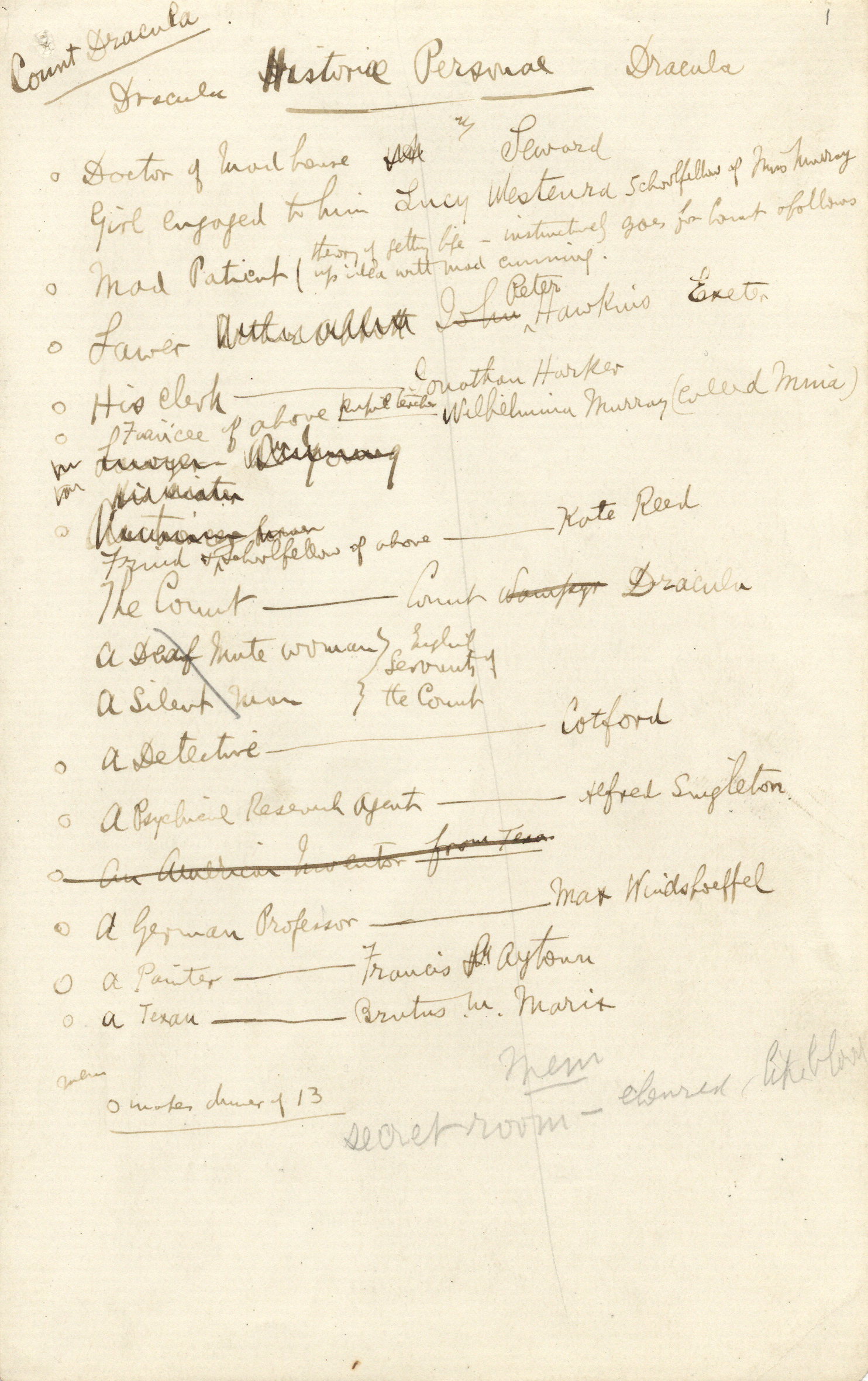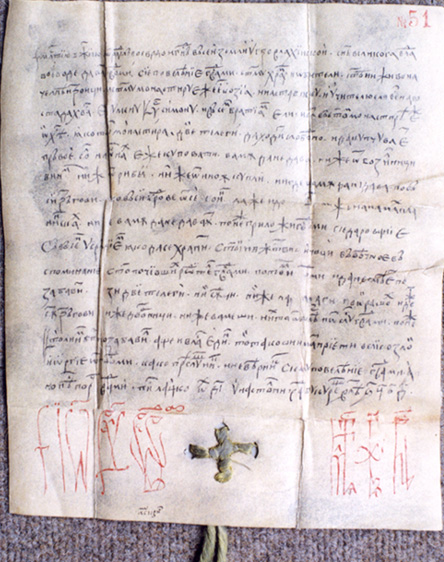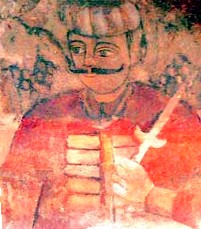|
Basarab II Of Wallachia
Basarab II was the Voivode of the principality of Wallachia (1442–1443), and the son of the former Wallachian ruler Dan II of Wallachia. Basarab II ruled during a turbulent time in Wallachia, now part of present-day Romania, with his rule falling between that of the father and son rule of Vlad Dracul and Mircea II. His reign was extremely short, as during that period only the strongest could retain their hold on the region for any great length of time. He took over as ruler in August 1442, holding on to it only until the Autumn of 1443, when Vlad Dracul forced him out. During that time, the power of the Ottoman Empire became stronger with each year, making them a constant threat to independent Wallachia. Anyone who ruled Wallachia had not only the Ottomans to deal with, but the internal conflicts of their own people. Politics had to be juggled between maintaining good relations with the Hungarian Kingdom, who were often needed as powerful allies against the invasions of the Ot ... [...More Info...] [...Related Items...] OR: [Wikipedia] [Google] [Baidu] |
List Of Rulers Of Wallachia
This is a list of princes of Wallachia, from the first mention of a medieval polity situated between the Southern Carpathians and the Danube until the union with Moldavia in 1859, which unification of Moldavia and Wallachia, led to the creation of Romania. Notes Dynastic rule is hard to ascribe, given the loose traditional definition of the ruling family. On principle, princes were chosen from any family branch, including a previous ruler's bastard sons, being defined as ''os de domn'', "of Voivode marrow", or as having ''heregie'', "heredity" (from the Latin ''hereditas''); the institutions charged with the Elective monarchy, election, dominated by the boyars, had fluctuating degrees of influence. The system itself was challenged by usurpers, and became obsolete with the Phanariotes, Phanariote epoch, when rulers were appointed by the Ottoman Empire, Ottoman Sultans; between 1821 and 1878 (the date of Romania's independence), various systems combining election and appointment were ... [...More Info...] [...Related Items...] OR: [Wikipedia] [Google] [Baidu] |
John Hunyadi
John Hunyadi (; ; ; ; ; – 11 August 1456) was a leading Kingdom of Hungary, Hungarian military and political figure during the 15th century, who served as Regent of Hungary, regent of the Kingdom of Hungary (1301–1526), Kingdom of Hungary from 1446 to 1453, under the minor Ladislaus the Posthumous, Ladislaus V. According to most contemporary sources, he was the member of a Nobility in the Kingdom of Hungary, noble family of Principality of Wallachia, Wallachian Hunyadi family, ancestry. Through his struggles against the Ottoman Empire, he earned for himself the nickname "Turk-buster" from his contemporaries. Due to his merits, he quickly received substantial land grants. By the time of his death, he was the owner of immense land areas, totaling approximately four million cadastral acres, which had no precedent before or after in the Kingdom of Hungary. His enormous wealth and his military and political weight were primarily directed towards the purposes of the Hungarian– ... [...More Info...] [...Related Items...] OR: [Wikipedia] [Google] [Baidu] |
15th-century Princes Of Wallachia
The 15th century was the century which spans the Julian calendar dates from 1 January 1401 (represented by the Roman numerals MCDI) to 31 December 1500 (MD). In Europe, the 15th century includes parts of the Late Middle Ages, the Early Renaissance, and the early modern period. Many technological, social and cultural developments of the 15th century can in retrospect be seen as heralding the " European miracle" of the following centuries. The architectural perspective, and the modern fields which are known today as banking and accounting were founded in Italy. The Hundred Years' War ended with a decisive French victory over the English in the Battle of Castillon. Financial troubles in England following the conflict resulted in the Wars of the Roses, a series of dynastic wars for the throne of England. The conflicts ended with the defeat of Richard III by Henry VII at the Battle of Bosworth Field, establishing the Tudor dynasty in the later part of the century. Constantin ... [...More Info...] [...Related Items...] OR: [Wikipedia] [Google] [Baidu] |
Year Of Death Unknown
A year is a unit of time based on how long it takes the Earth to orbit the Sun. In scientific use, the tropical year (approximately 365 solar days, 5 hours, 48 minutes, 45 seconds) and the sidereal year (about 20 minutes longer) are more exact. The modern calendar year, as reckoned according to the Gregorian calendar, approximates the tropical year by using a system of leap years. The term 'year' is also used to indicate other periods of roughly similar duration, such as the lunar year (a roughly 354-day cycle of twelve of the Moon's phasessee lunar calendar), as well as periods loosely associated with the calendar or astronomical year, such as the seasonal year, the fiscal year, the academic year, etc. Due to the Earth's axial tilt, the course of a year sees the passing of the seasons, marked by changes in weather, the hours of daylight, and, consequently, vegetation and soil fertility. In temperate and subpolar regions around the planet, four seasons ar ... [...More Info...] [...Related Items...] OR: [Wikipedia] [Google] [Baidu] |
List Of Wallachian Rulers
This is a list of princes of Wallachia, from the first mention of a medieval polity situated between the Southern Carpathians and the Danube until the union with Moldavia in 1859, which led to the creation of Romania. Notes Dynastic rule is hard to ascribe, given the loose traditional definition of the ruling family. On principle, princes were chosen from any family branch, including a previous ruler's bastard sons, being defined as ''os de domn'', "of Voivode marrow", or as having ''heregie'', "heredity" (from the Latin ''hereditas''); the institutions charged with the election, dominated by the boyars, had fluctuating degrees of influence. The system itself was challenged by usurpers, and became obsolete with the Phanariote epoch, when rulers were appointed by the Ottoman Sultans; between 1821 and 1878 (the date of Romania's independence), various systems combining election and appointment were put in practice. Wallachian rulers, like the Moldavian rulers, bore the titles of ' ... [...More Info...] [...Related Items...] OR: [Wikipedia] [Google] [Baidu] |
Bram Stoker
Abraham Stoker (8 November 1847 – 20 April 1912), better known by his pen name Bram Stoker, was an Irish novelist who wrote the 1897 Gothic horror novel ''Dracula''. The book is widely considered a milestone in Vampire fiction, and one of the most famous classics of English literature. The primary antagonist of the novel, Count Dracula, is often ranked among the most iconic and best-known fictional figures of the entire Victorian era, and the character's popularity has led to over 700 adaptations for films, movies, plays, comics, video games, cartoons, stage performances, and other forms of media. Although he was the author of 12 mystery novels and novellas, Stoker's reputation as one of the most influential writers of Gothic horror fiction lies solely with ''Dracula''. During his life, he was better known as the personal assistant of the actor Sir Henry Irving and business manager of the West End's Lyceum Theatre, which Irving owned. Stoker was also a distant relative o ... [...More Info...] [...Related Items...] OR: [Wikipedia] [Google] [Baidu] |
Dracula
''Dracula'' is an 1897 Gothic fiction, Gothic horror fiction, horror novel by Irish author Bram Stoker. The narrative is Epistolary novel, related through letters, diary entries, and newspaper articles. It has no single protagonist and opens with solicitor Jonathan Harker taking a business trip to stay at the castle of a Transylvanian nobleman, Count Dracula. Harker flees after learning that Dracula is a vampire, and the Count moves to England and plagues the seaside town of Whitby. A small group, led by Abraham Van Helsing, hunts and kills him. The novel was mostly written in the 1890s, and Stoker produced over a hundred pages of notes, drawing extensively from Folklore of Romania, folklore and History of Romania, history. Scholars have suggested various figures as the inspiration for Dracula, including the Wallachian prince Vlad the Impaler and the Countess Elizabeth Báthory, but recent scholarship suggests otherwise. He probably found the name Dracula in Whitby's public l ... [...More Info...] [...Related Items...] OR: [Wikipedia] [Google] [Baidu] |
Novel
A novel is an extended work of narrative fiction usually written in prose and published as a book. The word derives from the for 'new', 'news', or 'short story (of something new)', itself from the , a singular noun use of the neuter plural of ''novellus'', diminutive of ''novus'', meaning 'new'. According to Margaret Doody, the novel has "a continuous and comprehensive history of about two thousand years", with its origins in the Ancient Greek and Roman novel, Medieval Chivalric romance, and the tradition of the Italian Renaissance novella.Margaret Anne Doody''The True Story of the Novel'' New Brunswick, NJ: Rutgers University Press, 1996, rept. 1997, p. 1. Retrieved 25 April 2014. The ancient romance form was revived by Romanticism, in the historical romances of Walter Scott and the Gothic novel. Some novelists, including Nathaniel Hawthorne, Herman Melville, Ann Radcliffe, and John Cowper Powys, preferred the term ''romance''. Such romances should not be con ... [...More Info...] [...Related Items...] OR: [Wikipedia] [Google] [Baidu] |
Radu Cel Frumos
Radu III of Wallachia, commonly called Radu the Handsome, Radu the Fair, or Radu the Beautiful (; ; January 1475), was the younger brother of Vlad III ( Vlad the Impaler) and prince of the principality of Wallachia. They were both sons of Vlad II Dracul and his wife, Princess Cneajna of Moldavia. In addition to Vlad III, Radu also had two older siblings, Mircea II and Vlad Călugărul, both of whom would also briefly rule Wallachia. In 1462, he defeated his brother, Vlad III, alongside Ottoman Empire sultan Mehmed II, with whom Radu had a good relationship. Life with the Ottomans In 1436, Vlad II Dracul ascended to the throne of Wallachia. He was ousted in 1442 by rival factions in league with Hungary, but secured Ottoman support for his return by agreeing to pay tribute to the Sultan and also send his two legitimate sons, Vlad III and Radu, to the Ottoman court, to serve as hostages of his loyalty. Vlad and Radu were later educated in logic, the Quran and the Turkish and Pe ... [...More Info...] [...Related Items...] OR: [Wikipedia] [Google] [Baidu] |
Vlad The Impaler
Vlad III, commonly known as Vlad the Impaler ( ) or Vlad Dracula (; ; 1428/31 – 1476/77), was Voivode of Wallachia three times between 1448 and his death in 1476/77. He is often considered one of the most important rulers in Wallachian history and a national hero of Romania. He was the second son of Vlad Dracul, who became the ruler of Wallachia in 1436. Vlad and his younger brother, Radu, were held as hostages in the Ottoman Empire in 1442 to secure their father's loyalty. Vlad's eldest brother Mircea and their father were murdered after John Hunyadi, regent-governor of Hungary, invaded Wallachia in 1447. Hunyadi installed Vlad's second cousin, VladislavII, as the new voivode. Hunyadi launched a military campaign against the Ottomans in the autumn of 1448, and Vladislav accompanied him. Vlad broke into Wallachia with Ottoman support in October, but Vladislav returned, and Vlad sought refuge in the Ottoman Empire before the end of the year. Vlad went to Moldavia in 144 ... [...More Info...] [...Related Items...] OR: [Wikipedia] [Google] [Baidu] |
Sultan
Sultan (; ', ) is a position with several historical meanings. Originally, it was an Arabic abstract noun meaning "strength", "authority", "rulership", derived from the verbal noun ', meaning "authority" or "power". Later, it came to be used as the title of certain rulers who claimed almost full sovereignty (i.e., not having dependence on any higher ruler) without claiming the overall caliphate, or to refer to a powerful governor of a province within the caliphate. The adjectival form of the word is "sultanic", and the state and territories ruled by a sultan, as well as his office, are referred to as a sultanate ( '. The term is distinct from king ( '), though both refer to a sovereign ruler. The use of "sultan" is restricted to Muslim countries, where the title carries religious significance, contrasting the more secular ''king'', which is used in both Muslim and non-Muslim countries. Brunei, Malaysia and Oman are the only sovereign states which retain the title "sultan" ... [...More Info...] [...Related Items...] OR: [Wikipedia] [Google] [Baidu] |










